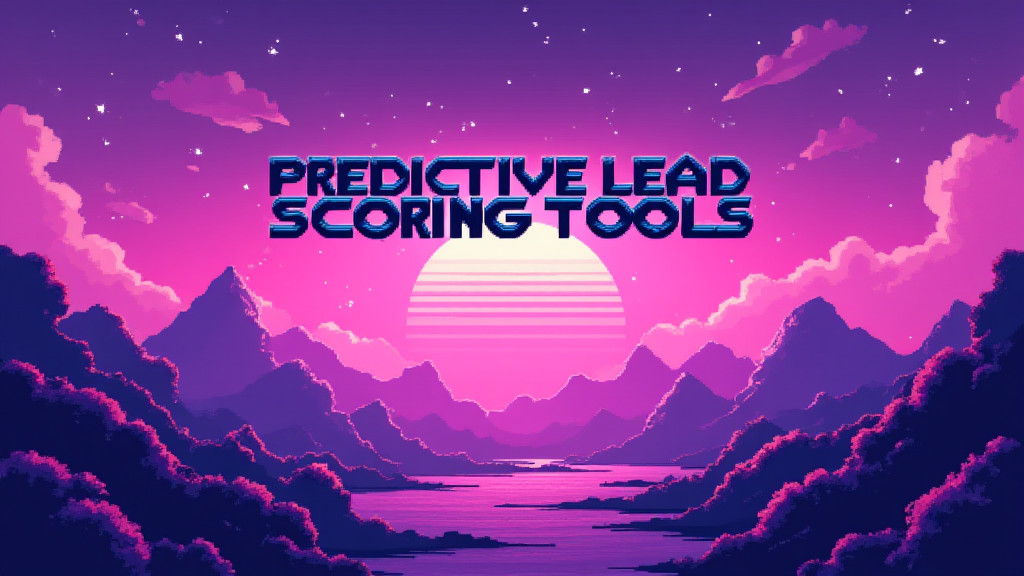Predictive Lead Scoring Tools: AI-Powered Sales

Published on: October 01, 2024
Predictive Lead Scoring Tools are advanced software solutions that leverage artificial intelligence (AI) and machine learning algorithms to evaluate and rank potential customers based on their likelihood to convert. These tools analyze vast amounts of data to identify patterns and characteristics of successful leads, helping sales and marketing teams prioritize their efforts and improve conversion rates. For more information on lead scoring models, you can explore further.
🎯 The Importance of Predictive Lead Scoring
In today's data-driven business landscape, predictive lead scoring has become a crucial component of effective sales and marketing strategies. Here's why:
- Improved Efficiency: By focusing on high-quality leads, teams can allocate resources more effectively.
- Increased Conversion Rates: Targeting the most promising leads leads to higher success rates.
- Better Alignment: Sales and marketing teams can work together more cohesively with a shared understanding of lead quality.
- Data-Driven Decision Making: Decisions are based on objective data rather than gut feelings or assumptions.
🔍 How Predictive Lead Scoring Tools Work
These tools typically follow a four-step process:
- Data Collection: Gather information from various sources, including CRM systems, website interactions, and third-party data providers.
- Data Analysis: Apply machine learning algorithms to identify patterns and correlations in the data.
- Model Creation: Develop a predictive model based on the analyzed data.
- Scoring: Assign scores to leads based on their likelihood to convert.
📊 Key Features of Predictive Lead Scoring Tools
| Feature | Description |
|---|---|
| AI-Powered Analysis | Utilizes machine learning to continuously improve scoring accuracy |
| Multi-Source Data Integration | Combines data from various touchpoints for a comprehensive view |
| Real-Time Scoring | Updates lead scores as new data becomes available |
| Customizable Models | Allows for tailoring of scoring criteria to specific business needs |
| Visualization and Reporting | Provides clear insights through dashboards and reports |
💡 Benefits of Implementing Predictive Lead Scoring
- Time Savings: Sales teams can focus on the most promising leads, reducing wasted effort.
- Improved ROI: Higher conversion rates lead to better return on marketing and sales investments.
- Enhanced Customer Experience: Tailored approaches based on lead scores result in more relevant interactions.
- Scalability: Automated scoring allows for handling large volumes of leads efficiently.
- Predictive Insights: Gain valuable foresight into future sales trends and opportunities.
⚠️ Challenges and Considerations
While predictive lead scoring tools offer significant advantages, there are some challenges to consider:
- Data Quality: The accuracy of predictions depends on the quality and quantity of input data.
- Integration Complexity: Implementing these tools may require significant changes to existing systems and processes.
- Overreliance on Automation: It's important to balance automated scoring with human intuition and expertise.
- Model Maintenance: Regular updates and refinements are necessary to maintain accuracy over time.
🚀 Implementing Predictive Lead Scoring Tools
To successfully implement these tools in your organization, consider the following steps:
- Assess your current lead scoring process and identify areas for improvement.
- Evaluate different predictive lead scoring tools and select one that aligns with your needs.
- Ensure you have clean, comprehensive data to feed into the system.
- Integrate the tool with your existing CRM and marketing automation platforms.
- Train your sales and marketing teams on how to interpret and act on the scores.
- Regularly review and refine the model to maintain its effectiveness.
By leveraging the power of predictive lead scoring tools, organizations can significantly enhance their sales and marketing efforts, leading to improved efficiency, higher conversion rates, and ultimately, increased revenue. Additionally, learning about the lead scoring system can provide further insights into optimizing your strategies.
🤔 Questions to Consider
As you contemplate implementing predictive lead scoring tools in your sales or marketing stack, ask yourself:
- How accurate is our current lead scoring process?
- What data sources can we leverage to improve our lead scoring?
- How will we measure the success of a predictive lead scoring implementation?
- What training will our team need to effectively use these tools?
- How can we ensure that our predictive models remain accurate and relevant over time?

















